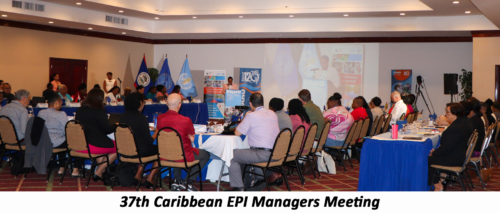by Kristen Ku
BELIZE CITY, Mon. Oct. 30, 2023
The Ministry of Health and Wellness, in collaboration with the Pan-American Health Organization (PAHO), held the 37th Caribbean Expanded Program on Immunization (EPI) Managers Meeting at the Belize Biltmore Plaza Hotel in Belize City on October 30.
The goal of the meeting, which was attended by 60 health representatives from 25 English and Dutch-speaking Caribbean countries, was to discuss achievements in 2022-2023 and future strategies in 2024 for immunization across various nations.

PAHO’s representative in Belize, Karen Lewis Bell, explained the significance of the meeting. “The Caribbean has always led the way in immunization,” she stated, recalling the early days when the Expanded Program on Immunization began back in 1977. By 1980, every Caribbean nation had its immunization programs up and running.
The joint initiative, with backing from CARICOM, has been instrumental in achieving this success.
The primary focus of the meeting centered on vaccine-preventable diseases. However, the broader scope of PAHO’s work, encompassing non-communicable diseases, communicable diseases, mental health, violence, and road traffic injuries, was also highlighted.
Bell drew attention to the increasing threat of diseases like dengue fever, which intensified due to climate change. Rising temperatures and changing ecosystems have expanded the habitat of disease vectors, like mosquitos, leading to new challenges in disease management and prevention.
“For example, the mosquito vectors; there are also some vectors that are now being identified further north in countries where the climate was traditionally colder, more temperate climate than tropical. And so, because of this, we are seeing increase in certain diseases,” she explained.
Unfortunately, while the country has traditionally aimed for a 95% immunization rate, the challenges of COVID-19 saw those figures drop dramatically. “In all the Caribbean countries, and maybe not only in the Caribbean but worldwide, there has been a decrease in the coverage of the vaccines before COVID, and COVID just came and made it a little bit worse because our coverage fell from 90, 95, 93, 92 to the 60s during COVID,” lamented Dr. Natalia Beer, the Maternal and Child Health Technical Advisor at the Ministry of Health & Wellness.
While there’s been some recovery, with rates now in the 80s, Belize is still striving to regain its former position. “We have a long way to go to get to that level where we were even before COVID,” she said.
However, health teams visit communities up to six times annually, ensuring that vaccines reach homes.
Yet, with vaccines so accessible, the current coverage remains comparatively low.
While Belize might currently be free from threats like measles, rubella, and polio, the risk of imported cases remains. Unvaccinated individuals, especially children, remain the most vulnerable.
As countries share best practices and confront shared challenges, the goal continues to be a healthier, disease-free Caribbean. In the words of Dr. Beer, “Having your child vaccinated and protected against these diseases, these preventable diseases, is the responsibility of the family.” With global threats like COVID-19 highlighting the importance of immunization, the message is clear– the fight is collective, and every shot counts.

